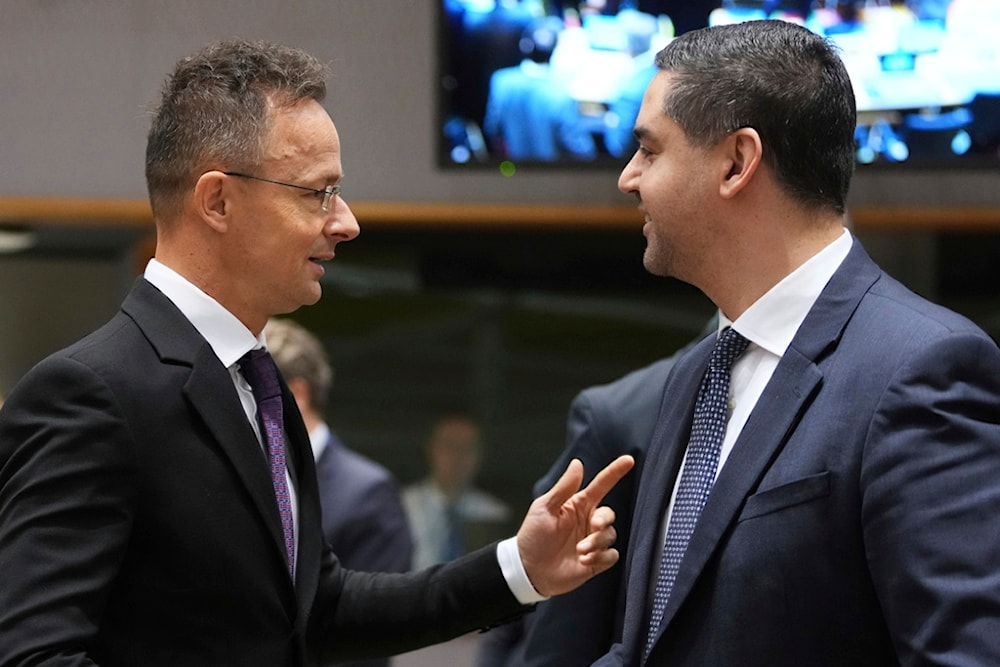Hungary FM says EU should not be surprised by US tariffs
Hungary's Foreign Minister says the tariffs imposed by Trump, which took the EU by storm, should not have come as a surprise.
-

Hungary's Foreign Minister Peter Szijjarto, left, speaks with Malta's Foreign Minister Ian Borg during a round table meeting of EU foreign ministers at the European Council building in Brussels, Monday, March 17, 2025 (AP)
Hungarian Foreign Minister Peter Szijjarto said on Friday that he does not understand why European Union countries and others around the world were surprised by the tariffs imposed by US President Donald Trump, emphasizing that such measures had been clearly signaled during the election campaign.
Speaking at a diplomatic forum in Antalya, Szijjarto stated, "I am really surprised that many actors of global politics, global economy, and many actors in Brussels behave as this was something surprising. The US presidential elections were held back in November, and the campaign was almost a year long. Everybody knew what to expect from both of the candidates."
Szijjarto noted that after Trump's election victory, it was clear he would adopt a political and economic strategy rooted in patriotism. "There are tariffs in the arsenal of patriotic economic policy; hence, sooner or later, they had to be used," he said.
He also criticized the EU Commission, saying Budapest had previously urged EU leaders to engage in negotiations with Washington to avoid tariffs. According to Szijjarto, the EU made a major error by failing to propose serious alternatives before the tariffs were imposed.
Earlier in the day, Hungarian Prime Minister Viktor Orban commented on the broader situation, describing the so-called tariff war between the United States and other countries as a tactical maneuver allegedly aimed at securing more favorable agreements for Washington.
Orban predicted that after achieving its goals, the United States would move toward restoring peace within a few months.
On April 2, Trump signed an executive order introducing reciprocal tariffs with a base rate of 10% on imports from other countries. However, on April 9, the US president announced that over 75 countries had refrained from retaliatory actions and requested negotiations. As a result, the 10% tariffs will remain in effect for 90 days for all countries except China.
EU retaliation to US tariffs could extend 'beyond customs duties'
The European Union's retaliation to the newly imposed 20% tariff by the United States on the bloc may not be limited to reciprocal duties on American imports, French Economy Minister Eric Lombard said on Friday.
"We are working on a response package that could indeed go beyond customs duties to bring the Americans to the negotiating table and reach a balanced agreement..." Lombard told RMC Radio on Friday, adding that the EU's response can be firm without mirroring the US approach, as tariffs on imports from the US could harm the bloc.
The minister called on French companies to demonstrate solidarity and patriotism in the face of the US measures while stressing that Europe must stand its ground against global powers "because we are now in a period of confrontation against the planet’s major blocs: the US, Russia, and China. Europe has what it takes to rise to the occasion, but it requires effort."
Previously, on Thursday, French President Emmanuel Macron urged national companies to halt any investments in the US until greater clarity emerges regarding the specifics of Trump's proposed tariffs, as the world prepares to go to a trade war with the US over its tariff bombardment policy.
"The consequences will be dire for millions of people around the globe," EU Chief Ursula von der Leyen said in a statement on April 9, adding that the European Union is planning on retaliating to the levies imposed by Trump should talks with the US falter. The European Union was hit with a 20% reciprocal tariff.

 4 Min Read
4 Min Read










